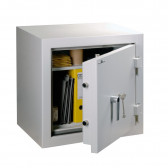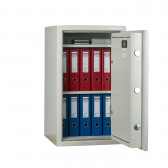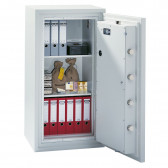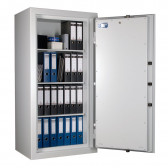Serious financial problems, temporary suspension of operations or even bankruptcy – such fates of banks can be encountered not only in times of financial crisis. Many individual customers should not worry about the safety of their deposits, since adequate protection is provided by the Bank Guarantee Fund (BFG). Nevertheless, some people still avoid keeping their savings in one place. Is this right?
Case study – SK Bank in Wołomin
Collapses of financial institutions in Poland are not a very common phenomenon, but there is no denying that such situations have occurred. The Cooperative Bank of Crafts and Agriculture (SK Bank) in Wolomin may serve as an example. Leading to its bankruptcy in 2015 is described as one of the biggest economic scandals of recent years. The main thread of the proceedings concerned the granting of 79 loans. They were granted primarily to entities from the Dolcan S.A. capital group or closely related to it economically.
The prosecutor's office established that in this case the property damage amounted to at least PLN 1.626 billion. Moreover, the perpetrators' actions led the investors to an unfavourable disposal of property of large sizes in connection with the issue of bonds of the bank in the amount of PLN 75 million. There were also investigated threads concerning actions to the detriment of holders of savings accounts in the bank, covering the total amount of PLN 385 million.
These are huge sums of money, but in this case, the problems were caused by the granting of successive loans, which were not repaid on time and which continued to be granted for the same or similar purposes. However, that is not all. The value of property indicated as collateral for financial obligations was also overstated. The procedure involved mainly using funds from deposits of the bank's customers and from the issue of bonds. As a result, the bank lost its financial liquidity and went bankrupt, including the Dolcan group.
BFG in action
An ordinary Kowalski, who is a client of a bank or cooperative savings and credit union (SKOK) that went bankrupt, should not lose his savings. The Bank Guarantee Fund (BFG) ensures the security of deposits up to the PLN equivalent of EUR 100,000. In certain cases, this limit reaches EUR 200,000.
The current list of entities covered by such protection is available at www.bfg.pl. Among them, there is Podkarpacki Bank Spółdzielczy (PBS) with its seat in Sanok. The BFG communiqués indicate that PBS was at risk of bankruptcy – it had, inter alia, a very low level of equity. 15. January 2020. Fund issued a decision on the forced restructuring of the bank, and two days later took control over it and appointed an administrator. These actions were taken using a bridge bank. The bank in question is Bank Nowy BFG S.A. – is an institution with capital of PLN 100 million, in which 100% of shares are held by the BFG.
As a result, PBS' operations were temporarily suspended. In practice, this meant, among other things, a technical interruption in online and mobile banking services, as well as in fixed branches. PBS cards and ATMs did not work. Subsequently, PBS resumed operations as Bank Nowy BFG S.A., while on 28. February 2020 a reverse transfer of certain property rights and liabilities from Bank Nowy BFG S.A. to PBS took place.
Reduce risk
According to the regulations, BFG guarantees cover both individual clients and clients of non-financial companies. Unfortunately, local government units, financial sector entities or the State Treasury, among others, cannot count on this type of protection.
Irrespective of the currency of the deposit, the disbursement of funds is guaranteed in zlotys and should take place within seven working days after an authorised institution applies for bankruptcy of a bank or SKOK. The BFG will publicly announce the date and place of the payout. In such a situation, the customer may either collect the cash or opt for a transfer to an account designated by him.
The Polish banking system is generally perceived as safe, but in the event of liquidity problems at an institution such as PBS, customers may have serious problems accessing their savings. During this time, they cannot use cash at an ATM, do their shopping or settle their liabilities. With this in mind, some people assume that it is not worth keeping all their money in one place. Therefore, they place their money in at least two financial entities, and sometimes they also store cash outside the banking system. This last step also involves some risk.
Sometimes savings are kept at home. Putting them in the proverbial "sock" is certainly not a recommended solution. Safes provide protection against theft or unwanted action of third parties, as well as protection against damage. The best choice are products from a reputable supplier with the appropriate certificates, such as Hartmann Tresore safes.
Read also: Poles prefer cash to a bank account. How to safely store money at home?
How and in which financial institutions or where we keep our deposits should be our individual decision. It is not worth using the first better proposal or taking into account first of all the distance to the nearest bank branch. Before making a choice, it is important to pay attention primarily to issues related to security, credibility of the offer, but also to the cost of the venture. The risk can be greatly reduced, but also a costly mistake can be made.
As the experience with Podkarpacki Bank Spółdzielczy described above shows, keeping "all the eggs in one basket" is risky and may prove fatal. It is worth being independent of the turbulence on the financial markets and having some cash on hand in a solid safe.
If you are interested in Hartmann Tresore products - please visit our homepage.





